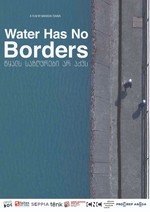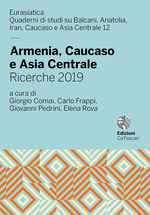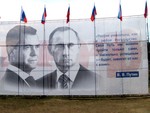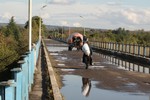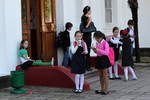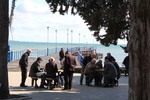"Water has no border", even along the Inguri - A documentary (brief review)
“Water has no border” - a 2021 documentary by Maradia Tsaava. See trailer and synopsis.
Seen at the Trento Film Festival in May 2022.
Crossing the de facto border (also known as administrative boundary line) between Abkhazia and Samegrelo is not so easy - unless you are water, or you work with water: employees working on the hydroelectric powerplant cross the border routinely.
“The other side” is just a few hundreds meters away at most throughout the film, and yet, seemingly unreachable for the film’s protagonist (Maradia) and her crew.
Nagorno Karabakh: sarà (nuovamente) guerra?
An online event on the Nagorno Karabakh conflict organised by ISPI [in Italian]
Official external support to de facto states in the South Caucasus [published in Italian]
De facto states in the South Caucasus are supported by a patron: Russia in the case of Abkhazia and South Ossetia, Armenia in the case …
Quantitative Analysis of Web Content in Support of Qualitative Research. Examples from the Study of Post-Soviet De Facto States
In recent years, the internet has been increasingly adopted as a key means of communication by local authorities, organisations and …
Post-soviet de facto states official reactions to events in Crimea
Representatives of authorities in all four post-Soviet de facto states issued statements in favour of Crimea’s referendum as an expression of the right to self-determination and declared their hope that this will contribute to a shift in international law. South Ossetia and Transnistria explicitly supported also Crimea’s annexation to the Russian Federation, while Nagorno Karabakh and Abkhazia refrained from doing so, at least for what concerns official statements issued so far.
Moscow's approach towards de facto states after Kosovo's recognition
Kosovo’s declaration of independence in February 2008 marked a change in Russia’s approach towards Abkhazia and South Ossetia in the months preceding the war in Georgia in August 2008. Five years later, a short journey through this change in Moscow’s official rhetoric
ICG’s report on Abkhazia, some notes on the footnotes
ICG’s latest report on Abkhazia is timely and its recommendations show the way forward. As usual, it provides a wealth of information and details. Yet, it is not without imprecisions
In Abkhazia, worried about the language law
The law “On the state language”, approved by the authorities in Sukhumi in 2007, risks exacerbating inter-ethnic relations in Abkhazia, a territory that remains largely multi-ethnic, even after the ethnic cleansing that happened during the war. Our correspondent went to Abkhazia to find out more about it. A feature story
Abkhazia’s Armenians, multilingualism is the future
At home they speak Hamshen, a variety of western Armenian. At school, they study eastern Armenian, as spoken in Yerevan. According to Sukhumi authorities, they will need to speak Abkhaz within a few years. Most of them, though, prefer to just speak Russian. An interview with Suren Kerselian, former president of the Armenian community in Abkhazia
Random notes on Abkhazia, October 2011
– Coming from Zugdidi, no passport control whatsoever from the Georgian side. Just a man standing near a post. On the way back, I was asked my passport, job title, and, funnily, phone number.
– In Gali, roads are in terrible conditions, plenty of potholes, asphalt rarely to be seen. Just out of town, as soon as the Gali districts ends, a good recently asphalted road starts… done just a few months ago.
